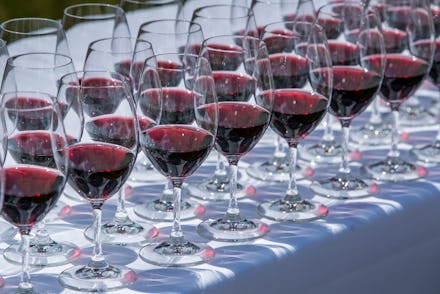Sorry, Wine Lovers: Moderate Drinking May Not Actually Help You Live Longer

Science has bad news for people who enjoy a glass of wine with dinner.
Past research has pointed to a link between alcohol and longer lifespans. But according to depressing new findings out of the University of Victoria's Center for Addictions Research of British Columbia, moderate drinking might not, in fact, help you live longer.
Ugh. Can we get a drink?
Researchers collected and analyzed 87 past studies on alcohol and different causes of death, according to CBS News.
While examining studies that link moderate alcohol consumption and increased longevity, the researchers discovered a problem: The results were skewed, making moderate alcohol consumption — anything from one drink per week to two drinks a day — appear more healthy than it actually is.
"It's become a very central part of our relationship with alcohol," lead author Tim Stockwell said, according to CBS News. "The belief that it's not only fun and enjoyable but that it's doing us good. But there are so many grounds to be skeptical about that."
Why the skewed results? Most of the studies had an "abstainer bias." That means when they compared moderate drinkers to non-drinkers, the non-drinkers frequently included people who abstained from alcohol because of other health problems. That might be why casual drinkers appeared healthier than their dry counterparts.
All but 13 of the studies were colored by abstainer bias, according to CBS News.
You can probably guess what the researchers found when they adjusted the studies for abstainer bias: Moderate drinkers don't actually live longer than people who don't drink.
American biologist Raymond Pearl, author of the 1926 book Alcohol and Longevity, is said to have pioneered the connection between moderate drinking and increased longevity. Over the years, some scholars have described the relationship between alcohol and longevity using a J-shaped curve, with moderate drinking correlating to the lowest mortality risk.
"We saw a change from this famous J-shape curve suggesting moderate drinking is good for health to the J-shape curve vanishing," Stockwell said, according to CBS News. "So abstainers and low-volume, occasional drinkers were all pretty similar in terms of risk from dying of any causes."
Instead of non-drinkers, future studies on the health benefits of alcohol should use occasional drinkers as a baseline, the researchers suggested.
In the meantime, it's probably safe to say the occasional glass of wine is better for your health than a fizzy, acid-green energy drink.